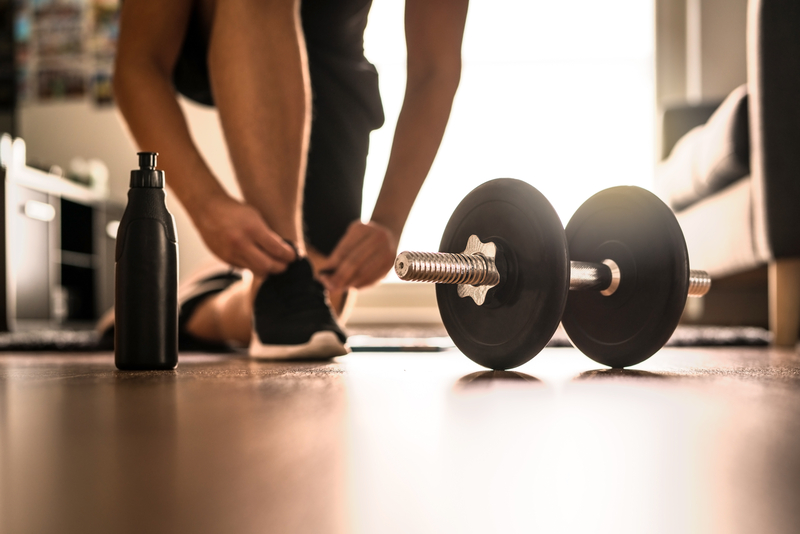Is it Better to Work Out in the Morning or Evening?

Is it better to work out in the morning or evening? That’s a great question! What’s the most important thing when it comes to exercising? That you actually do it! What’s the second most important thing? When you do it! Schools of thought vary when it comes to deciding on the best course of action, and there are strong advocates in both camps.
What are the Exercise Guidelines?
According to current standards, adults should ideally do at least two and a half hours of moderate-intensity aerobic type activity a week. Alternatively, you can do a minimum of 75 minutes of high-intensity activity each week to meet the minimum standards of exercise.
Additionally, guidelines state that adults should also engage in resistance training at least twice per week and that it should encompass all the major muscle groups. Include balance and flexibility training to round out your cardio and weight-training sessions.
While there are no current guidelines on when it’s best to do what, these benefits may help you figure out the best strategy for you.
The Benefits of Working Out in the Morning
There are a lot of great reasons to work out in the morning.
• Get it done—there’s something to be said for getting your workout done first thing in the morning. When you make it a priority and attend to it first, you won’t be stuck later in the day trying to find time to fit it in. Nothing will prevent you later in the day from getting in your physical activity. Missing or skimping on your exercise plan won’t happen, allowing you to be more productive all day long.
• Optimal fat-burning zone—if your primary goal is to burn body fat, then morning workouts are your friend. While doing cardio at any time of day is going to be helpful, hormone output and glycogen levels are optimal for fat burning first thing in the morning before eating. Why? Because during the night, you’ve used all the energy in your blood, so you will go straight into fat-burning mode. This is why you’ll often see people doing “fasted cardio.”
• You may sleep better—because exercise can rev up your system and leave you feeling overheated, it may be harder to get to sleep easily at night if all your tough workouts are close to bedtime. Try switching your workouts to the morning and see if it helps to reset your circadian rhythm, so you feel more awake and alert in the morning than you usually would.
• Start your day off right—when you begin your day with a solid workout, you automatically feel great and have a sense of accomplishment. You can check that box on your goals and healthy habits list. This can help propel you to knocking things out for the rest of the day. Plus, you won’t have a workout “hanging over your head” and can focus on other tasks.
• Boost your mood all day—exercise releases endorphins, and that means it puts you in a naturally better mood. Prioritizing your exercise to first on the agenda can leave you happy, refreshed, less stressed, and ready to face the challenges of your day.
Benefits of Working Out in the Evening
And, there are a lot of great reasons to work out in the evening as well…
• Resistance training in the evening can help boost sleep—studies show that if you engage in resistance training in the evening, it may positively impact your ability to sleep. In a 12-week 2018 study, sleep was measured among three test groups: those who did solely aerobic activity, those who performed resistance training, and those who did nothing. The group who did resistance training in the evenings experienced better sleep metrics as well as reduced blood pressure.
• Hormone output—working out in the evening can help set you up for maximum growth hormone release, leading to better muscle-building ability while you sleep. Studies also show that late afternoon and evening workouts are more advantageous for muscle building due to the increased exercise-related use of testosterone and a warmer body temperature, making it the prime environment for strength, power, and hypertrophy (that is, muscle size) gains.
• Sleep in—if you’re not working out in the morning, that just might mean more sleep for you! If you’re a person who has hectic mornings, then a morning workout might be counterproductive. If you’re short on sleep and still trying to get up extra early for exercise, you could be setting yourself up for a spike in cortisol (the stress hormones), which can also leave you feeling irritated and holding water. Instead, take that time to ensure you get enough sleep and push that workout to the evenings.
• Stress relief—what better way to wind down your day and put problems behind you than wearing yourself out at the gym?! Additionally, the time away from work, screens, obligations, and others stressors can help you unwind and naturally destress as you go through your workout and allow your brain to focus on the task at hand.
• Take advantage of the extra energy—when you wake up, your body has typically used all the energy created from eating food the day before. When you eat, your body breaks down the calories into sugar called “glycogen,” and this is what is in your blood and powers you through your day. That’s why doing cardio in this fasted state is ideal for fat burning since you have no energy sources from which to tap besides body fat. However, later in the day, after you’ve eaten a number of meals, your glycogen levels are restored and ready to power you through heavy resistance training for optimal performance.
Is Morning or Evening Workout Best for You?
While there may be many reasons to work out at one time of day versus another, it should essentially boil down to what’s best for you. Here are a few things to take into consideration:
What is your most pressing goal? While you may want to simultaneously lose body fat while building muscle mass, it may be best to narrow it down. Out of the two desired outcomes, which one is the most pressing for you? If you mainly need to burn off body fat, yes, you absolutely do want to put on metabolically active muscle tissue to help you burn off more calories on the regular. But, from a visual standpoint, burning off body fat may need to become your number one goal at the moment. So, make fat loss your primary goal and muscle building your secondary goal, proceeding accordingly.
What does your schedule look like? Are you working a normal 9 to 5 job, or do you work evenings or even nights? Do you have certain obligations that would make it tough or impossible to fit in a workout at certain times of the day?
The bottom line, of course, is to get in your workout when you can. While morning and evening workouts both have their appeal, the most important thing is that it gets done. Or, if you’re feeling very industrious and want to maximize the benefits of both worlds, do your cardio in the morning and your weight training in the evening for the most bang for your workout buck.




 7 Signs Your Body is Seriously Low on Collagen (not just wrinkles)
7 Signs Your Body is Seriously Low on Collagen (not just wrinkles) Health Expert: "Turmeric Doesn't Work (unless...)"
Health Expert: "Turmeric Doesn't Work (unless...)" 3 Warning Signs Your Probiotic Supplement is a Total Waste
3 Warning Signs Your Probiotic Supplement is a Total Waste

